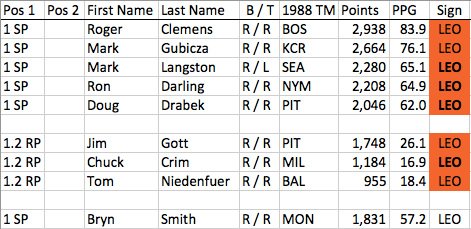1988 Astrology League Recap
View the 1988 FABL Lineups Here!
Growing up in Los Angeles in the 90’s, I have had to sit through many a Dodgers broadcast that replays Kirk Gibson’s iconic pinch-hit walk-off home run off Dennis Eckersley in Game 1 of the 1988 World Series. As an A’s fan, I felt my heart drop deeper into the pit of my stomach with each triumphant fist pump from that Gemini slugger, as the Libra star closer looked on in dismay. These two signs will become very important later, as the winner and runner-up in the Air Division… but first I’ll take you through the three top-scoring astrology divisional leaders.
Leo scored the most fantasy points in the Fantasy Astrology Baseball League in 1988… but only if you ignore positional eligibility rules when setting their starting lineup. For example, I allowed third baseman (and Positive Polarity MVP runner-up) Paul Molitor to slot in at second base (where he had played 19 games in ’87), and right fielder Tom Brunansky to man center field. But without those adjustments, Virgo would emerge as the leader – a more meaningful accomplishment, considering their entire starting lineup (led by Robin Yount and Ellis Burks) meets positional compliance.
Perhaps not coincidentally, these two signs had the Cy Young Award winners for each polarity. Virgo (and Dodgers) ace Orel Hershiser (3,064 / 87.5) was the only player to break 3,000 points this season, en route to a real-life National League CYA. Roger Clemens (2,938 / 83.9) was not the only Leo pitcher among the PP top three: Mark Gubicza (2,664 / 76.1) finished third in points to Aries (and fellow Fire sign) lefty Frank Viola (2,824 / 80.7). Meanwhile, Hershiser’s two runners-up were not only both Earth signs, but both Capricorns: David Cone (2,804 / 80.1) and Danny Jackson (2,788 / 79.7). Virgo’s pitching excellence extends beyond the starting rotation, as lefty John Franco (2,103 / 30.0) was the only NP relief pitcher to break 2,000 points, easily putting him in line for the Reliable Reliever award.
The Negative Polarity MVP played for the Cancer Crabs, the undisputed leaders of the 1988 Water Division. Right fielder Jose Canseco (2,958 / 18.7) reached rarefied air by being the first player ever to join the 40-40 club (home runs and stolen bases), even though he couldn’t lead his Athletics to a World Series title. Interestingly enough, the NP MVP runner-up, Capricorn Rickey Henderson (2,617 / 18.7), would later play with Canseco in Oakland, after the A’s re-acquired Henderson from the Yankees in 1989. NP MVP third-place finisher Mike Greenwell (2,535 / 16.0) was also a Cancer, as was NP RR runner-up Doug Jones (1,971 / 38.6).
While the positional shenanigans with Leo and Virgo altered who was named 1988’s top-scoring sign, they didn’t impact the winners of their divisional races. That was not the case with Libra and Gemini in the Air Division, whose point totals came right down to the wire. Each sign had one of the Positive Polarity’s top four scoring batters: Wade Boggs (2,336 / 15.1) for Gemini, Dave Winfield (2,305 / 15.5) for Libra. (They were all clumped together along with Paul Molitor and PP MVP Andy Van Slyke (2,372 / 15.4), the Sagittarius center fielder.) Libra also had the Positive Polarity’s top rookie, starting pitcher Tim Belcher (1,991 / 55.3) – whose Negative Polarity counterpart was Capricorn third baseman Chris Sabo (1,738 / 12.7).
But nowhere is the positional situation more evident than in the bullpen. The top three Positive Polarity relievers in 1988 include two Libras – Dennis Eckersley (2,235 / 37.3) and Jeff Reardon (1,908 / 30.3) – and one Gemini: Don Robinson (1,936 / 38.0), who started 19 of his 52 appearances. I always feel conflicted counting someone with Robinson’s 1988 resume as a reliever, because so many of his fantasy points came from innings he accrued as a starter. But I also feel uncomfortable putting him in the rotation, because he has more relief appearances than starts. It’s an Astrology Baseball conundrum that I haven’t fully come to terms with.
But even eliminating Robinson’s points from the tally isn’t enough to keep Gemini below Libra when both teams have to stick with positional eligibility rules. There are three times I bent the rules for my “official” 1988 Libra batting order, and I’ll go through them from least to most egregious. Number one is putting Kevin McReynolds (2,150 / 14.6) in center field, a position he hadn’t played since 1986… but would return to briefly in 1991. Steve Buechele (1,384 / 8.9) had only two games at second base in ’88, but he had 51 games there over the previous two years, and would rack up another 18 games in ’89. Hubie Brooks (1,698 / 11.2) was shifted abruptly from shortstop to right field in 1988, and would never return to the infield for his career.
All in all, Libra loses out on 1,883 fantasy points when forced into compliance, as their best alternates at the positions in question were Gerald Young (1,734 / 11.6), who would actually replace George Bell (1,862 / 11.9) with McReynolds moving to DH, Glenn Hubbard (665 / 6.3), and Ernie Riles (715 / 6.0). That’s the most of any sign (Taurus was next with 1,716). In the meantime, Gemini loses 1,269 points, all from Robinson, which would turn a 553 point deficit into a 121 point victory. I know they didn’t have Wild Cards back in 1988, but if there was ever an occasion for an Astrology Baseball play-in game, this would be it.
Next time, I’ll continue my in-depth looks at the 2021 signs with Capricorn, the highest-scoring sign that did not win its division.




